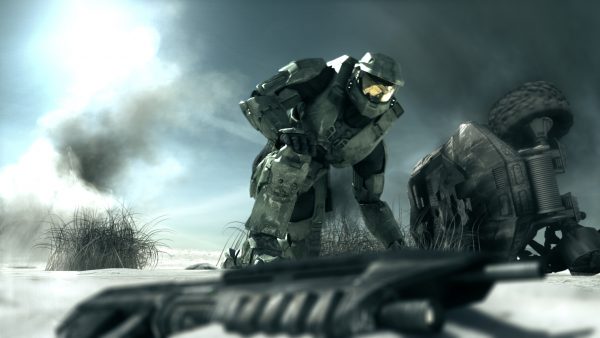There are very few series which can be described as gaming royalty, which inarguably changed the landscape of video games for everybody. The Halo series undoubtedly falls into that category.
Part of that comes down to simple longevity. The first game in the series came out all the way back in 2001, and the most recent was released in 2017; sixteen years of smash hits is pretty impressive, however you look at it! Large parts of their success also come from their creativity and the quality of their execution, both of which we’ll look at in more detail later in the article.
There have been a total of 13 Halo releases (not all of which have been full-scale sequels). Here are the no-doubt, slam-dunk best games from the Halo series.
[easyazon_link identifier=”B00009TW6R” locale=”US” nf=”y” tag=”gamerbolt-20″ cart=”y” cloak=”y” localize=”y” popups=”n”]Halo: Combat Evolved[/easyazon_link]
Developers Bungie had originally intended for their first Halo game to be a simple PC and Mac release. Following a buyout by Microsoft, however, it instead became one of the flagship titles for the new Xbox console. The rest, as they say, is history. Since that moment, no other single game or series has become so iconic to the Xbox.
Of course, it wasn’t sheer dumb luck which made this happen. Firstly, Halo: Combat Evolved had an intriguing sci-fi plot, dropping you straight into the middle of an intergalactic war; this story went on to spawn a number of spin-off novels and video series. Then, there were the mechanics. Chief amongst these was the decision to limit the number of weapons you could carry to two; a stark contrast to contemporary titles, like Half Life, in which your character was essentially a walking arsenal.
Halo: Combat Evolved truly advanced the first-person shooter genre, in a way which few other games have done before or since.
[easyazon_link identifier=”B00008J7NZ” locale=”US” nf=”y” tag=”gamerbolt-20″ cart=”y” cloak=”y” localize=”y” popups=”n”]Halo 2[/easyazon_link]
Following the enormous success of Combat Evolved (5 million total sales), a Halo sequel was inevitable. Bungie were more than happy to oblige, with Halo 2 being released three years after the original, in 2004.
Halo 2 doubled down on much of what made the original game great, including the joyous vehicle-handling. Bungie weren’t afraid to make alterations to their winning formula, however, with dual-wielding weapons being the most eye-catching mechanical change.
Perhaps the biggest advancement of all came in the multiplayer arena; something which has arguably proved to be the series’ hallmark. It had already been a big part of the attraction with Combat Evolved, but much of the action there had been local multiplayer. With Halo 2, multiplayer was opened up to a vastly larger audience thanks to the incorporation of Xbox Live. It was the most-played online game on Xbox for nearly two whole years, and this, perhaps over anything else, was the reason why Halo became so wildly popular.
[easyazon_link identifier=”B0034JKYO6″ locale=”US” nf=”y” tag=”gamerbolt-20″ cart=”y” cloak=”y” localize=”y” popups=”n”]Halo Wars[/easyazon_link]
And now, for something completely different! Halo made its name through excellently-executed first-person shooter games, but following another successful sequel – Halo 3 – publishers Microsoft Studios decided they wanted to change things up.
They brought in Ensemble Studios – of Age of Empires and Age of Mythology fame – to create a real-time strategy Halo game. This was a big risk to take, considering both the importance of the franchise and the inconsistent results of RTS games on consoles.
The results were impressive, with Ensemble doing a good job of creating a control scheme that felt intuitive with a controller, and retaining the unique Halo atmosphere and aesthetics that the fans had come to adore. The commercial success which the game enjoyed – over one million units sold – helped to pave the way for sequel Halo Wars 2, which is actually the most recently-released game in the series at the time of writing.
[easyazon_link identifier=”B00DB9JV5W” locale=”US” nf=”y” tag=”gamerbolt-20″ cart=”y” cloak=”y” localize=”y” popups=”n”]Halo 5: Guardians[/easyazon_link]
Following the excellent Halo: Reach in 2010, original developers Bungie actually left the Halo series. It was left to 343 Industries to fill their sizeable shoes and, to be fair to them, the franchise barely missed a beat.
Halo 4 was certainly a worthy first effort, but for our money Halo 5: Guardians – released on Xbox One in 2015 – was even better. It made a colossal $500million-worth of sales in its first week, and was generally embraced by critics as a good entry into the series. The story was certainly one of the most intriguing so far, with Master Chief going AWOL, allowing players a rare opportunity to take control of a different main character. An interesting mechanical addition was the permanent inclusion of allies by your side, to whom you could give commands. Whilst its campaign could have been longer, Halo 5 was a blast from start to finish.
Sixteen years on, and the Halo series shows absolutely no signs of slowing down. Whilst it was notable by its absence at E3 in 2017, the quality of the most recent main entry into the series – Halo 5 – and of course the astounding continued financial success, should ensure that we don’t have to wait too long for a fresh Halo game.


